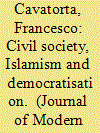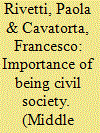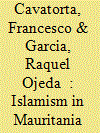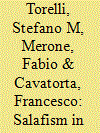|
|
|
Sort Order |
|
|
|
Items / Page
|
|
|
|
|
|
|
| Srl | Item |
| 1 |
ID:
101528


|
|
|
|
|
| Publication |
London, Routledge, 2011.
|
| Description |
xiii, 172p.
|
| Series |
Routledge studies in Middle Eastern politics; 22
|
| Standard Number |
9780203850589, hbk
|
|
|
|
|
|
|
|
|
|
|
|
Copies: C:1/I:0,R:0,Q:0
Circulation
| Accession# | Call# | Current Location | Status | Policy | Location |
| 055575 | 320.9174927/CAV 055575 | Main | On Shelf | General | |
|
|
|
|
| 2 |
ID:
072279


|
|
|
|
|
| Publication |
2006.
|
| Summary/Abstract |
The positive role that an active civil society plays in processes of democratisation is often highlighted in the literature. However, when it comes to the Middle East and North Africa, such activism is considered to be detrimental to democratisation because the predominant role is played by Islamist groups. The explanation for this rests with the perceived 'uncivil' and undemocratic Islamist ethos of such groups. This paper challenges this assumption and argues that Islamist associations can be a potential force for democratisation for three reasons. First, they are capable of political learning; secondly, they generate secular civil society activism as a response to their activities, increasing the number of actors in the political and social system; and finally, they can cooperate with other civil society groups on a number of issues, given that they are all subject to the same authoritarian constraints. The paper focuses in particular on the case of Morocco and the Islamist group Jamiat al-Adl wal-Ihsan.
|
|
|
|
|
|
|
|
|
|
|
|
|
|
|
|
| 3 |
ID:
079324


|
|
|
|
|
| Publication |
London, Routledge, 2007.
|
| Description |
170p.
|
| Standard Number |
97804154411479
|
|
|
|
|
|
|
|
|
|
|
|
Copies: C:1/I:0,R:0,Q:0
Circulation
| Accession# | Call# | Current Location | Status | Policy | Location |
| 052652 | 321.8091767/VOL 052652 | Main | On Shelf | General | |
|
|
|
|
| 4 |
ID:
122053


|
|
|
|
|
| Publication |
2013.
|
| Summary/Abstract |
Through a non-conventional understanding of civil society activism, the article provides an explanation of the relationship between the student movement and Khatami's governments in Iran. This study approaches 'civil society' as a space where we may observe the dynamics and exercise of power. The case study of the interactions between the Daftar-e Tahkim-e Vahdat and Khatami's governments illustrates how civil society is not a fixed concept, but a contested one. By analysing the conflicts and interactions between these two actors, the article examines the continuous negotiations that reinvent the meaning of civil society and produce political inclusion or exclusion.
|
|
|
|
|
|
|
|
|
|
|
|
|
|
|
|
| 5 |
ID:
154242


|
|
|
|
|
| Summary/Abstract |
The rise of Islamism following the Arab Spring has renewed interest in the democratic credibility of Islamist parties and movements. Focusing on the case of Mauritania's Islamists this article analyses the validity of the moderation hypothesis and argues that for some Islamist parties, moderation, when historically situated, has always been a key trait. The case of Mauritanian Islamism is interesting because it takes place within an intellectual and geographical place that straddles both the Arab world and sub-Saharan Africa, therefore providing insights on how Islamism has become an influential ideological framework in both worlds, that are much less separate than superficially believed.
|
|
|
|
|
|
|
|
|
|
|
|
|
|
|
|
| 6 |
ID:
092170


|
|
|
|
|
| Publication |
2009.
|
| Summary/Abstract |
The 2004 reform of the family code in Morocco has been held as one of the most significant liberal reforms undertaken in the country, and has led scholars and policy makers to argue that this demonstrates the democratic progress Morocco and the King are making. At the same time, the role of the women's movement in getting the reform approved has seemingly confirmed that associational life is crucial in promoting democratisation. This paper, building on theoretical work questioning the linkage between a strong civil society and democratic outcomes, argues that civil society activism does not necessarily lead to democratisation, and may reinforce authoritarian practices. Far from demonstrating the centrality of civil society, the process through which the new family code was passed highlights the crucial institutional role of the monarch, whose individual decision-making power has driven the whole process. Authoritarianism finds itself strengthened in Morocco despite the liberal nature and outcome of the reform.
|
|
|
|
|
|
|
|
|
|
|
|
|
|
|
|
| 7 |
ID:
144737


|
|
|
|
|
| Summary/Abstract |
The survival of the Moroccan monarchy amidst the wave of protests that characterised the Arab uprisings did not come as a surprise to observers of the Kingdom. Despite the size of the protests in February 2011, demonstrators never demanded the fall of the monarchy and the king was never in danger of being dethroned. Once the King reclaimed political leadership through the launch of a constitutional reform, the protest movement faded and whatever challenge to the pre-eminence of the monarchy might have existed ended quickly. A number of explanations have been advanced for the survival of authoritarianism in Morocco, but they generally rehash conventional wisdoms about Moroccan politics that might no longer be as valid as they were in past. Less obvious factors, ranging from repressive practices to ‘de-politicisation through technocracy’ and from the complex impact of neo-liberal economics on social relations to divisions within the opposition, contributed to the survival of the monarchy.
|
|
|
|
|
|
|
|
|
|
|
|
|
|
|
|
| 8 |
ID:
084804


|
|
|
| 9 |
ID:
118989


|
|
|
|
|
|
|
|